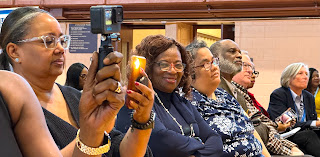Reflections on the MACCD Disability Summit: Building a More Inclusive Memphis
I recently attended the Memphis Advisory Council for Citizens with Disabilities (MACCD) Disability Summit at Orange Mound, and the energy in the room was palpable. Although 50 people were signed up, I’d estimate about 75 attendees came together for this important event.
The summit opened with remarks from Mayor Paul Young, who spoke candidly and passionately about the theme of inclusion. He pledged to lead the most inclusive administration in Memphis history—a bold and encouraging commitment to a city striving for equity.
Voices of Advocacy and Expertise
The summit showcased diverse voices from the MACCD, each focusing on critical areas of concern:
- Kim Dourghty, chair of the Disability Awareness Committee, emphasized the importance of raising awareness.
- Carlene Leaper, from the Arc and Christina Clift, of Disability Connection Midsouth, addressed the persistent challenges in transportation.
- Mr. Calvin Poole spoke about the pressing need for accessible and affordable housing.
- Jolanna Chapman highlighted barriers and opportunities in education and employment.
Their insights painted a comprehensive picture of the systemic changes needed to make Memphis more inclusive for its disability community.
Rethinking Safety and Inclusion
As I listened, I found myself reflecting on the intersection of safety, poverty, and implicit bias. Often, we frame safety as a standalone issue, imagining it as something solvable through police or government intervention. Yet, “safety” is deeply intertwined with economic disparities and societal biases. True safety requires addressing these root causes, not just their symptoms.
Personal Stories and Calls to Action
Councilwoman Jerri Green, a parent of three children on the autism spectrum, shared her personal and professional perspective. Transportation, she noted, is the number one complaint she hears from the disability community. She briefly mentioned accessible rideshare options but stressed that listening to people with disabilities must be central to shaping solutions.
One of the most moving moments came from Kia Shine, a father of a child with autism, rapper and actor in the movie Red One. Speaking from the heart, he challenged everyone to embrace inclusion:
“We have to work together to create a better scenario of inclusion. We are the inclusion. I stand here not as a rapper, actor, but as a father of a child with autism, a caregiver. I live it every day. Your life is a testimonial. Awareness, inclusion, acceptance!”
Moving Forward
The summit was a reminder of the power of collective action and lived experience in driving change. It underscored the importance of listening to those directly impacted and working collaboratively toward solutions. As Mayor Young emphasized, inclusion isn’t just an idea; it’s a commitment.
If Memphis is to become a truly inclusive city, we must all play a role in turning these conversations into action. It’s not just about disability awareness—it’s about ensuring equity and opportunity for everyone.
What steps can we each take to build a more inclusive Memphis? How can we elevate the voices of those who have too often been unheard? Let’s continue these conversations and turn them into meaningful change.





